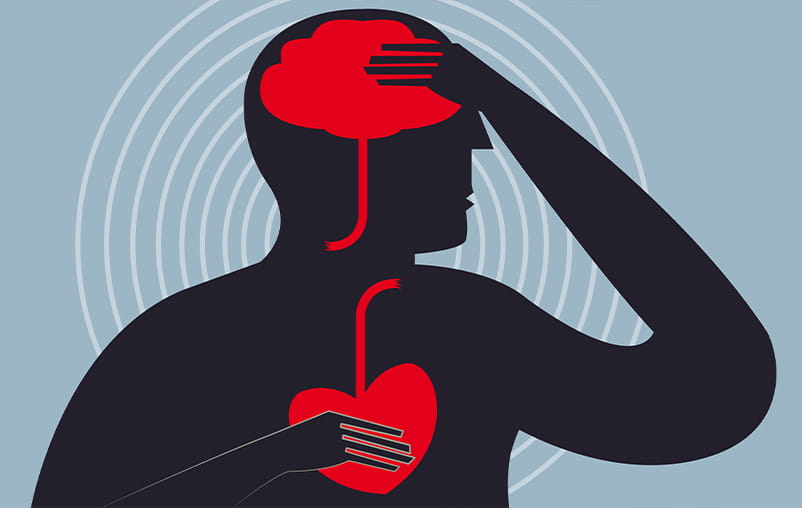Carbohydrates, “carbs,” are an essential nutrient, and are the preferred source of fuel for the body, particularly the brain which uses 20-40% of the total energy provided by them. It’s helpful to use this analogy: Carbohydrates are to the brain as gasoline is to a vehicle.
Carbohydrates are often vilified due to their effect on blood sugar and potential for weight gain if consumed in excess amounts. Popular fad diets like the “keto diet” severely restrict the intake of carbs and is liberal in the consumption of protein and fats, which could lead to cardiovascular risks from high cholesterol.
How Many Carbs Do You Need?
The general recommendation is for 45-60% total calories to come from carbohydrates. The Recommended Dietary Allowance (RDA) for carbohydrate (130 g/day) is an average minimum requirement1. The general recommendation is to consume 60-75g and 45-60g per meal, for men and women respectively.
A small amount of carbohydrate from the diet gets stored away in the liver and muscle. The storage form of carbohydrate is called glycogen. This is used when a person has been fasting for prolonged amounts of time, during sleep for example. It’s the body’s back-up fuel tank, a survival mechanism, to prevent the blood sugars from going too low.
What Are Carbohydrates?
Carbohydrates have two forms: simple “sugar” and complex “starch.” They are found in many different foods.
Simple Carbs “Sugar”
Simple carbs are easily digested and absorbed, which causes blood sugar to rise quickly.
• Lactose is the form of sugar found in cow’s milk
• Fructose is the form of sugar found naturally in fruits, honey, and agave
• Sucrose is the form commonly known as “table sugar” which is found in many highly processed foods and beverages like soda, fruit juices, candies, ice cream, etc.
Excess intake of these can lead to weight gain and elevated blood sugar, which can lead to the development of Type 2 diabetes.
Complex Carbs “Starch”
Complex carbs are the preferred source of carbohydrates in the diet. They take longer for the body to digest and absorb, thus slowing the rate blood sugar will rise. Complex carbohydrates also contain fiber.
The human body doesn’t have the ability to digest some fibers, so they don’t affect blood sugar. However, the indigestible fiber serves as food for the good gut bacteria in the colon. A high-fiber diet is favorable for maintaining blood sugar control as well as a healthy gut microbiome.
Good sources of complex carbohydrates are:
- Whole grains (whole grain bread, whole wheat pastas, brown rice)
- Starchy vegetables (corn, peas, all potatoes, jicama, butternut squash)
- Beans/legumes/lentils (pinto beans, kidney beans, black beans)
How Carbohydrates Affect Blood Sugar
Carbohydrate digestion begins in the mouth by an enzyme in the saliva called amylase. Once in the stomach, the carbs are further broken down by other enzymes produced by the intestines, and pancreas, until they are in the smallest form called glucose. Glucose is then passed into the blood stream, which is how we get blood glucose, also known as “blood sugar.”
When blood glucose levels rise, the pancreas produces insulin, a hormone, which acts as a “key” to open the “cell door” and allow glucose to funnel inside. Once inside the cell, the glucose goes through a process to make energy for the body.
In conditions like diabetes, the body does not make enough insulin or does not use it efficiently enough to funnel all of the glucose out of the blood and into the cells. Thus, blood sugar levels rise higher and higher after each meal.
The higher the carb content of the meal, the higher the blood sugar will raise. Each type of carbohydrate food will affect people differently, which is not well understood. Any excess carbohydrates consumed are converted to fat and stored in the body as “reserve” fuel sources; this can lead to weight gain and obesity over time.
Restricting carbohydrates too low will cause the brain to go into “survival mode.” The body will then break down muscle tissue to use as fuel, which is not an ideal scenario. Insufficient carbohydrate intake can lead to dangerously low blood sugar, also known as hypoglycemia.
Practical Tips for Managing Blood Sugars
Eat Complex Carbs
The best way to manage your blood sugar is to include a variety of complex carbohydrate sources in the diet daily, such as:
- Whole grains
- Starchy vegetables
- Beans and legumes
Avoid Processed Foods
Avoid highly processed foods which often have large amounts of added sugar but no valuable nutrients. These include:
- Sugar-sweetened beverages
- Juice
- Sports drinks
- Cookies
- Candies
- Desserts
Watch Your Portion Sizes
Monitor the portion sizes of carbohydrate containing foods. Restaurant meal portions are often much larger than a person needs.
Cook at Home
Cook more at home to have control over the ingredients in each meal. Get the kids and other family members involved in the planning and preparing of foods.
Get Enough Sleep, Water and Exercise
Daily physical activity helps lower blood glucose, exercise requires the energy created from carbohydrates. Most experts recommend 150 minutes of moderate to vigorous activity per week.
- Choose an exercise routine that you enjoy and stay consistent to see results and reap the benefits2.
- Drink plenty of water daily.
- Get 7-9 hours of restful sleep each night.
Health Care Maintenance and Resources
Schedule regular visits with your health care provider to monitor your A1C at least yearly. If the test is abnormal, more frequent labs will be required. The A1C is a lab test measures the average blood glucose levels over a 2-3 month period.
If a person is living with diabetes, it is important to monitor blood sugar levels daily. The best time to check blood glucose is first thing in the morning before food or drink, and two hours after meals. It’s helpful to record your blood glucose readings, bring the log to provider visits. This helps health care providers identify and track patterns, to make treatment decisions.
A registered dietitian can provide education on reading nutrition facts labels and portion control to meet your carbohydrate needs. The goal of a registered dietitian is to educate and empower you with this knowledge to make healthy meal planning decisions to meet specific health goals.
Classes at University Health
University Health offers a variety of free classes on subjects of Diabetes Self-Management Education (DSME), pre-diabetes, weight loss and heart health. Classes are offered year-round and are taught by expert Certified Diabetes Care and Education Specialists (CDCES).
Ask your provider for a referral or call 210-358-7100 and speak with Patient Education Services for more information.
Citations
- Institute of Medicine: Dietary Reference Intakes: Energy, Carbohydrate, Fiber, Fat, Fatty Acids, Cholesterol, Protein, and Amino Acids. Washington, DC, National Academies Press, 2002
- Piercy KL, Troiano RP, Ballard RM, et al. The Physical Activity Guidelines for Americans. JAMA. 2018;320(19):2020–2028. doi:10.1001/jama.2018.14854




